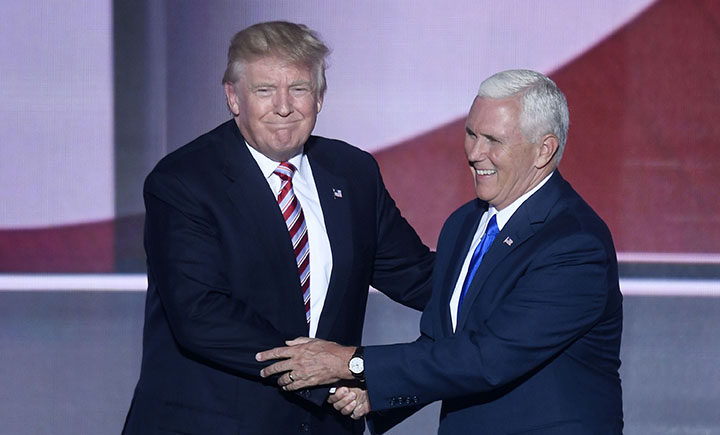Safe Space and the Body Politic
Republican presidential nominee Donald Trump appears on stage with vice presidential choice Mike Pence on the third day of the Republican National Convention at Quicken Loans Arena in Cleveland on Wednesday, July 20, 2016. (Olivier Douliery/Abaca Press/TNS)
Safe Space. Oops, did I trigger someone? How ironic that the concept of a place absent of triggers has become so triggering itself. Safe spaces are on the front lines of the debate over free speech, and that front line just saw some action.
Recently Vice President-elect Mike Pence attended a showing of the musical Hamilton and, during the curtain call, received a brief message from the cast asking for his administration to “uphold our American values and work on behalf of all of us.” President-elect Trump tweeted in response that “The Theater must always be a safe and special place.”
What’s that you hear? Trump, a man whose website places defeating political correctness alongside such issues as trade and immigration, defending safe spaces?
In related news, The Federalist also criticized the absence of talk shows with a conservative leaning, prompting Salon.com to incredulously conclude that conservatives want their own safe spaces. What’s going on here? In part, this apparent hypocrisy is actually the result of clashing definitions of safe space
In the most basic sense, a safe space is a type of neutral zone. But what does “neutral” itself mean? One type of neutral is where all discussion of debated topics is halted. There can be no bias because there are no opinions being expressed. Another neutral is where only opinions people are comfortable with can be spoken, and thus there is no conflict, although, in this author’s opinion, a more appropriate name for such a place is “echo chamber.”
The last neutral is where everyone can voice their opinions and not have to fear being shouted down or threatened. The neutrality here is in terms of to power. No one has an artificial advantage, there’s an even playing field, and only logic and evidence can advance your cause.
Each of these neutrals has a place. Sick of everyone freaking out over politics and just want some friendly banter at Thanksgiving? There’s nothing wrong with politely asking your crazy uncle to stop his rant and move on to different topics.
Want a logical and respectful discussion where everyone can make his or her point and not walk away from a shouting match where everyone thought the louder you are the more persuasive? That’s the neutral for most public forums and educational institutions. Once in a blue moon, even an echo-chamber can be appropriate when one needs a sympathetic ear.
But this leaves the question, what neutral should the theater be, if any?
President-elect Trumps seems to support the theater being neutral in the “no discussion zone” sense. I would normally support this stance for an entertainment venue, but in this particular instance I have to respectfully disagree. Why? Because Hamilton isn’t just entertainment.
Besides dramatizing the the Revolutionary War, the establishment of the First National Bank, and the creation of the First Party System, all inherently political topics, Hamilton is also a means of political expression for its creator.
Lin-Manuel Miranda wrote the musical in part to express his beliefs about the nature of freedom and justice in the United States as well as the vital role of immigrants in our history. To ask that he not involve politics in theater would be like asking all TV channels to kindly refrain from expressing any opinions. Obviously, that violates the principles of free speech and clearly indicates the “no discussion” safe space doesn’t work here.
One might then conclude that the safe space in question should be of the “even playing field” variety. But considering the situation the cast of Hamilton put VP-elect Pence in, is an even playing field really possible? The cast delivered its speech to Pence on stage, on camera, with pre-prepared words and before an audience that had largely booed Pence when he entered (although, to the cast’s credit, they discouraged the booing).
There was really no opportunity for Pence to reply, since doing so would mean walking all the way back through the theater, climbing on stage or addressing them from below, and making up his response on the spot. If an even playing field is about everyone involved having equal power, having an equal chance to speak and have their message heard, then the theater clearly can’t be equal at all.
So what conclusion can be drawn from this whole affair? What type of safe space should the theater be? I believe the answer is: none at all. The theater isn’t about discussion or debate. Actors don’t invite the playgoers to sit in an armchair beside them and express their views like a tv show host: the communication is one way.
The cast of Hamilton has the right to express its views, but everyone’s best interests are served when they do it in the most powerful way they can, by just performing. Miranda’s views don’t need a speech tacked on to the end, the musical expresses them most effectively and personally through its very existence.
Yet this whole debacle leaves fans of both Hamilton and free speech with some important questions to ask ourselves. The next time we ourselves call for a safe space, do we do so out of a desire for equality, freedom, and respect, or just to advance our own message?



